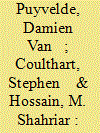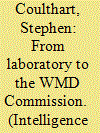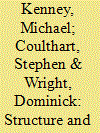|
|
|
Sort Order |
|
|
|
Items / Page
|
|
|
|
|
|
|
| Srl | Item |
| 1 |
ID:
157974


|
|
|
|
|
| Summary/Abstract |
This article explores the role big data plays in the national security decision-making process. The global surveillance disclosures initiated by former NSA contractor Edward Snowden have increased public and academic discussions about big data and national security. Yet, efforts to summarize and import insights from the vast and interdisciplinary literature on data analytics have remained rare in the field of security studies. To fill this gap, we explain the core characteristics of big data, provide an overview of the techniques and methods of data analytics, and explore how big data can support the core national security process of intelligence. Big data is not only defined by the volume of data but also by their velocity, variety and issues of veracity. Scientists have developed a number of techniques to extract information from big data and support national security practices. We find that data analytics tools contribute to and influence all the core intelligence functions in the contemporary US national security apparatus. However, these tools cannot replace the central role of humans and their ability to contextualize security threats. The fundamental value of big data lies in humans' ability to understand its power and mitigate its limits.
|
|
|
|
|
|
|
|
|
|
|
|
|
|
|
|
| 2 |
ID:
169007


|
|
|
|
|
| Summary/Abstract |
Academic research can improve national security, yet the process by which findings flow from the ivory tower to intelligence agencies is not well understood by scholars. This article addresses this gap through an exploratory case study of when research impacted intelligence: the incorporation of cognitive biases research in intelligence analysis. The results of this study illustrate the importance of idea entrepreneurs—individuals who promote academic research—as well as the need for making academic findings applicable to intelligence practitioners. These results, while based on a single case, suggest new avenues for scholarship exploring knowledge utilization in intelligence.
|
|
|
|
|
|
|
|
|
|
|
|
|
|
|
|
| 3 |
ID:
171234


|
|
|
|
|
| Summary/Abstract |
In 2005, the Intelligence Community Centers for Academic Excellence (IC CAE) grant was established to help strengthen and diversify the US intelligence workforce. Seed funds are provided for colleges and universities to establish academic programs and offer professional development opportunities. We surveyed grant recipients and compiled academic programs (degrees, minors and certificates) to gauge how well IC CAE is meeting stated objectives and to identify which program features are perceived as most valuable. We found 49 such academic programs, significant placements of IC CAE graduates in both governmental and non-governmental sectors, and high regard for most professional development opportunities.
|
|
|
|
|
|
|
|
|
|
|
|
|
|
|
|
| 4 |
ID:
156540


|
|
|
|
|
| Summary/Abstract |
This study combines network science and ethnography to explore how al-Muhajiroun, a banned Islamist network, continued its high-risk activism despite being targeted for disruption by British authorities. We analyze news reports, interviews, and field notes using social network analysis and qualitative content analysis to test hypotheses pertaining to network structure and performance. Our analysis suggests that the activist network’s structural properties had important implications for its performance during three separate time periods. What began as a centralized, scale-free-like, small-world network centered on a charismatic leader evolved into a more decentralized “small-world-like” network featuring clusters of local activists connected through multiple bridges. This structure allowed the activist network to engage in contentious politics even as its environment became increasingly hostile. We conclude by discussing the implications of al-Muhajiroun’s small-world solution for scholars and policy makers.
|
|
|
|
|
|
|
|
|
|
|
|
|
|
|
|
| 5 |
ID:
153081


|
|
|
|
|
| Summary/Abstract |
The importance of problem structuring – the activity of making sense of problems – has been grasped by many scholars of policy analysis, a profession that shares much in common in form and function with intelligence analysis. This article imports some of the lessons, frameworks and methodologies of problem structuring to intelligence analysis from policy analysis. The concept of a Type III error is introduced, the analytical mistake of misunderstanding a problem, along with several methodologies designed to help analysts structure problems. One such methodology from policy analysis, called boundary analysis, is demonstrated on a national security case, the 2014 Syrian chemical weapons destruction process.
|
|
|
|
|
|
|
|
|
|
|
|
|
|
|
|
| 6 |
ID:
149293


|
|
|
|
|
| Summary/Abstract |
This article presents findings from the first publicly available survey generalizable to an intelligence agency to explore why analysts use structured analytic techniques (SATs). Mandated by the Intelligence Reform and Terrorism Prevention Act (2004), SATs are simple methodologies supposed to make analysis more transparent and, hopefully, valid. Despite the US government’s investment in training thousands of analysts, there is no solid evidence on how often or why analysts actually use SATs. A survey of 80 analysts and nine follow-up interviews at the State Department’s Bureau of Intelligence and Research reveals a simple, but important, truth: implementing the techniques requires training and compelling evidence they will improve analysis. Other factors, most notably the amount of time pressure an analyst experiences, were not significantly related with the use of the techniques despite anecdotal accounts and conjecture from the literature. Future research should examine other intelligence agencies to cross-validate these findings. If these findings hold in other cases, intelligence agencies should focus on reforming and incorporating evidence into the training process.
|
|
|
|
|
|
|
|
|
|
|
|
|
|
|
|
|
|
|
|
|